BRILLO BUILDING
Brute Force, Confections of Love (BarNone Records) *****
Tammi Terrell: Come On And See Me, The Complete Collection (Hip-O Select) ****1/2
“It was 1968 for fuck’s sake!” That was me, getting a bit impatient in the car with the girlfriend when she didn’t find “King of Fuh,” the George Harrison-abetted, First Amendment-flaunting single by Stephen Friedland (aka Brute Force), all that fuh-ny. I mean, it’s not that funny. Nor is it an effective linguistic argument about the ass-backwardness of American prudence (it was immediately banned for its lack of subtlety). When Harry Nilsson sang “fuck you” with giddy vehemence some years later, society was more forgiving. Nilsson’s lack of tact was directed toward a woman who’d been “breaking his heart,” and possibly glasses as well. Conventional wisdom teaches that girls cloud men’s brains to the point where a faux pas or two are warranted. Brute’s Dadaism, on the other hand—it’s really about worshipping “beauty”—was inexcusable.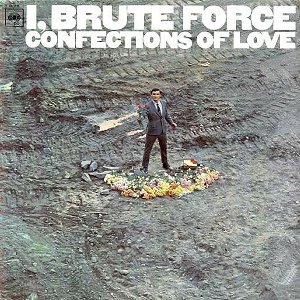
Another problem with “King of Fuh” is, counter-intuitively, its brevity: It’s a silly sucker punch in the mug that seems too cowardly to stick around and examine the damage it’s caused. Confections of Love, however, the bubblegum tunesmith’s debut recorded just months earlier, is a ripe, musty masterpiece of anti-pop. It’s the same shitty-joke mentality as his f-bomb 45 pulled taut into a half hour of brilliant Brill Building mockery; the crap gags are a fulcrum of self-deprecation against the already vomit-inducing saccharine superficiality of the genre.
“The Sad Sad World of Mothers and Fathers” is more smartly angry, for example, than high priest of late-60s satire Frank Zappa’s own middle-class exposÁ© “Brown Shoes Don’t Make It” because the stagy bombast is fully domestic rather than an excuse for sexual pandering. Meanwhile, the titular town of “Tierra Del Fuego” becomes increasingly impossible to pronounce either due to drunken distance or lingual indolence; nothing could be finer or wiser than “To Sit On a Sandwich,” an ersatz-R&B paean to sliced bread urbanity; and “Brute’s Party” (a fÁªte with Bonzo Dog Band goody bags) ritualizes detached congregation with ice-breaking xylophones. True to the title, the lion’s share of tracks in some way detonate amorous bombs, and the most immaculate satire—”No Olympian Height”—is so straight-faced a romance that the over-baked imagery takes a minute to tickle you (“Angels coming over hills, gathering daffodils”). A staff songwriter, Brute probably could have knocked off a dozen more listenable, devilish ditties between nine and five and still taken a leisurely lunch: The importance of the ones recorded increases as we acknowledge their intricate disposability.
It’s no secret or surprise that genuine Brill Building schlock was often interpreted most believably by African American singers, the result of plagiarized tonal zeal being returned to its owner post-perversion. A lot of early Marvin Gaye is soulful Brill-inspired pop rather than soul per se (tunes about where wine comes from excepted), especially his duets with the late and largely unsung Tammi Tarrell. Hip-O Select has collected and remastered all of Tammi’s solo work in a double-disc plea for canonization that beautifully illustrates the top shelf of Motown’s crossover appeal; most of the “rarities” included are readily available elsewhere, but the sparkling copy of her only LP, Irresistible, and some unreleased live material from the Roostertail make the compilation October’s penultimate archival gem.
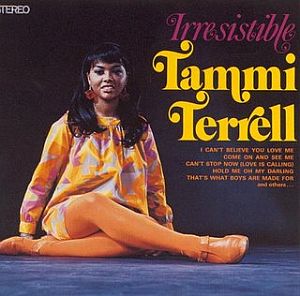 As a playbook of pop conventions, Irresistible is no less infectious than Confections of Love, but rather than coaxing the clichÁ©s into a private chamber and playing whack-a-mole with them like Brute, Tammi earnestly invites them up on stage and enriches their clumsy whiteness. Produced and written largely by Motown staffers Harvey Fuqua and Johnny Bristol, the compositions blow caramelized raspberries at Bacharach/David stock tricks like time signature schizophrenia and stark drum breakdowns while Terrell’s voice sweetly covers their fingerprints. She’s also brainy enough to imbue “Tears at the End of a Love Affair” with more optimism than unfulfilled grief, and the casual longing of “Come On and See Me” makes you want to drive to her grave and rest donuts against her tombstone.
As a playbook of pop conventions, Irresistible is no less infectious than Confections of Love, but rather than coaxing the clichÁ©s into a private chamber and playing whack-a-mole with them like Brute, Tammi earnestly invites them up on stage and enriches their clumsy whiteness. Produced and written largely by Motown staffers Harvey Fuqua and Johnny Bristol, the compositions blow caramelized raspberries at Bacharach/David stock tricks like time signature schizophrenia and stark drum breakdowns while Terrell’s voice sweetly covers their fingerprints. She’s also brainy enough to imbue “Tears at the End of a Love Affair” with more optimism than unfulfilled grief, and the casual longing of “Come On and See Me” makes you want to drive to her grave and rest donuts against her tombstone.
Tammi’s the big-eyed girl whose innocent act is the product of fiercely analytical worldliness rather than naivety; we run to her for comfort because she’s seen the dark side of relationships and knows they’re still worth it. As the exemplary liner notes by scholar Daphne Brooks point out, a malignant brain tumor claimed Terrell’s life too soon. But it could have just as easily been the “Tapeworm of Love.” “It’s eating my heart out over yoooooooou.”
BEFORE THERE WAS STEVE JOBS…
Apple Records Box Set (Capitol Records) ***1/2
Come and Get It: The Best of Apple Records (Capitol Records) ****
The aural epitome of the Beatles’s money-blinded infantilism, the Apple Records catalogue now looks like a clearinghouse for one-off experiments, debuts with more promise than legitimate art, and post-heyday gasps of desperation. But that’s why it’s better to take in as a whole, as a protean collection of post-hippie anxiety rushing us through a baffling and occasionally nauseating dark ride of late-60s pop. The new Apple Records box set is missing a few gems of genuine weirdness from the corps roster—e.g., the fabled Frank Sinatra “Lady Is a Tramp” 45 (the master was purposely destroyed), the soundtrack to Alejandro Jodorowsky’s acid western El Topo, plus albums by the Van Eaton brothers, David Peel, and Elephant’s Memory. And though the reasons for omitting these were probably driven by the quality of available source material and perceived audience demand, the set’s left with an indubitable McCartney/Harrison-centricism that may reveal whose indulgence the label truly was.
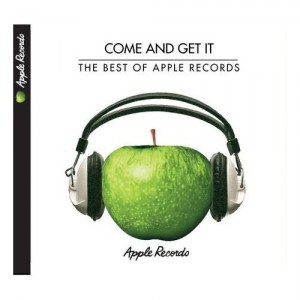 Mary Hopkin, dippy Welsh folk lite singer, recommended by Twiggy and signed by Macca; Badfinger, sloppy progenitors of what we now know as power pop, and engineers of Big Star’s mortal-and-pestle-of-sound blueprint, signed by Mal Evans but Pauls’s cover band for their first single; James Taylor, gentle pseudo-jellyroll junkie, again signed and partially produced by McCartney (“Carolina in My Mind,” his debut’s best track, is like a Ram outtake with better lyrics and background vocals). Billy Preston and Jackie Lomax both snagged first dibs on sparkling new Harrisongs publications—and we don’t need to review who brought in Radha Krishna Temple.
Mary Hopkin, dippy Welsh folk lite singer, recommended by Twiggy and signed by Macca; Badfinger, sloppy progenitors of what we now know as power pop, and engineers of Big Star’s mortal-and-pestle-of-sound blueprint, signed by Mal Evans but Pauls’s cover band for their first single; James Taylor, gentle pseudo-jellyroll junkie, again signed and partially produced by McCartney (“Carolina in My Mind,” his debut’s best track, is like a Ram outtake with better lyrics and background vocals). Billy Preston and Jackie Lomax both snagged first dibs on sparkling new Harrisongs publications—and we don’t need to review who brought in Radha Krishna Temple.
Most of the albums themselves feel like novelties stretched to LP-length thinness; even Taylor’s, which, despite featuring his second strongest batch of songs, swelters under the professionalism of a ubiquitous, Thermidorian horn section (they glossily kick off “Night Owl,” a three dollar blowjob of a blues number, with plastic soul arpeggios). Doris Troy’s little eponymous rocker is more of a series of steel-stringed cameos—Steve Stills! Peter Frampton!—than a record, with nothing even bothering to aim for the gaiting simplicity of her prior hit “Just One Look.” The Modern Jazz Quartet’s twofer is splendidly uplifting in the sense that it makes one feel as though he’s trapped in a slow elevator. Jackie Lomax is still pretty dreadful, and I skip through most of Badfinger’s records to the singles, with the exception of the Todd Rundgren-produced Straight Up (“Take It All,” about begrudgingly communal marital assets, is still their most anthemic anthem). John Tavener’s orchestral stuff starts out with essential information about the Whale, and then sails off into second-rate Schoenberg.
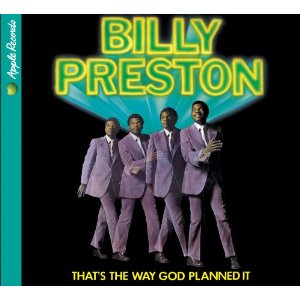 Billy Preston’s That’s the Way God Planned It might be the most consistent album to rise from the rueful smoke of the Beatles’s auto-destruct triggering. Preston tones down the bland funk of his earlier material and whips out astonishing songwriting competency—”It Doesn’t Matter,” “Everything’s All Right,” and the title track are unthinkably spirited tributes to Taoist complacency with God himself on Fender. He essays the same thing on Encouraging Words, but he’s better at celebrating his lack of worry than he is at motivation (his version of “My Sweet Lord,” however, makes Harrison’s inadvertent Chiffons rip-off worthwhile).
Billy Preston’s That’s the Way God Planned It might be the most consistent album to rise from the rueful smoke of the Beatles’s auto-destruct triggering. Preston tones down the bland funk of his earlier material and whips out astonishing songwriting competency—”It Doesn’t Matter,” “Everything’s All Right,” and the title track are unthinkably spirited tributes to Taoist complacency with God himself on Fender. He essays the same thing on Encouraging Words, but he’s better at celebrating his lack of worry than he is at motivation (his version of “My Sweet Lord,” however, makes Harrison’s inadvertent Chiffons rip-off worthwhile).
All the albums come with unimportant bonus tracks (where’s the gospel production of “Fire and Rain” we were promised in the liner notes to the last issue of James Taylor?), and there’s a single disc compilation with even more oddball marginalia, like “King of Fuh” (see BRILLO BUILDING, above).
SIT DOWN
Jethro Tull, Stand Up 2CD & DVD Edition (EMI Records) **1/2
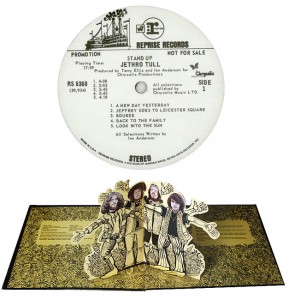 Edgar Allan Poe felt the term “poetry” was a subjective measure; a piece of literature was “poetic” only if it elated him. By that yardstick, he fathomed, most of Paradise Lost is actually prose. We might arrive, by way of goofy extrapolation, at a similar conclusion for Jethro Tull’s career, which possesses more food than music: Starchy noodles (Thick as a Brick), potato and leek soup (Aqualung), and Chocolate Ensure® (Too Old to Rock and Roll…). The meat is confined to the first two albums, before Ian Anderson forgot what British blues sounded like, with their sophomore effort Stand Up the less tainted of the two filets. The over-processed vocals of “A New Day Yesterday” might even seem intimidatingly emotive, especially for those unaware of, say, “Beggar’s Farm.” “Bouree” instills Bach’s Gibraltar-like melodies with a ponderous waiting that Glenn Cornick’s adequate bass chords jazzily diffuse. “Fat Man” is a midnight sleigh ride. And “We Used to Know” is one of several bridges between Tull’s more emotion-conscious incunabulum and their later, wanky essays. (Anderson’s agnosticism is that of the petulant orphan who wants to be spanked into place by an absentee parent.)
Edgar Allan Poe felt the term “poetry” was a subjective measure; a piece of literature was “poetic” only if it elated him. By that yardstick, he fathomed, most of Paradise Lost is actually prose. We might arrive, by way of goofy extrapolation, at a similar conclusion for Jethro Tull’s career, which possesses more food than music: Starchy noodles (Thick as a Brick), potato and leek soup (Aqualung), and Chocolate Ensure® (Too Old to Rock and Roll…). The meat is confined to the first two albums, before Ian Anderson forgot what British blues sounded like, with their sophomore effort Stand Up the less tainted of the two filets. The over-processed vocals of “A New Day Yesterday” might even seem intimidatingly emotive, especially for those unaware of, say, “Beggar’s Farm.” “Bouree” instills Bach’s Gibraltar-like melodies with a ponderous waiting that Glenn Cornick’s adequate bass chords jazzily diffuse. “Fat Man” is a midnight sleigh ride. And “We Used to Know” is one of several bridges between Tull’s more emotion-conscious incunabulum and their later, wanky essays. (Anderson’s agnosticism is that of the petulant orphan who wants to be spanked into place by an absentee parent.)
EMI’s three-disc reissue sounds fantastically gritty, but we’ve heard this remaster before in the single-disc 2001 release. The record is complicated here with subpar supplements: There’s some singles, a washed-out mono version of “Living in the Past,” plus a bunch of meandering live performances that don’t sound any better in DVD audio (disc three). Anderson plays an early draft of “My God” that’s slightly more convincing than what would wind up (pun intended) on Aqualung, but you’ll find yourself saying, “At least it’s not Topographic Oceans-era Yes” too many times throughout the remainder. The packaging recreates the original pop-up gatefold; hopefully this one’s more durable than the LP’s.
STUFF I MISSED
With major box sets released by Bob Dylan, Elvis Presley, Miles Davis, John Lennon, and others, October 2010 has proved just about the most painful month in which to christen a reissue column (thus the tardiness). I borrowed the Dylan set but haven’t moved too far past the single channel shock of his folky debut. In stereo, the cracking, warbly baritone and choppy acoustic tempo of ”You’re No Good” spill over the edges of the envelope and dribble into the gutter; in mono, they fill the song’s sonic levee to the breaking point.
I’ve also heard most of the Lennon, and despite the more robust cleansing, I vastly prefer the purist nightmares that Yoko put out at the start of the 2000s. (This copy of Plastic Ono Band is hissy, and the track “Hold On” is inexplicably missing about a half-bar of the intro.) Feel free to discuss other uncovered reissues in the comments.




Comments